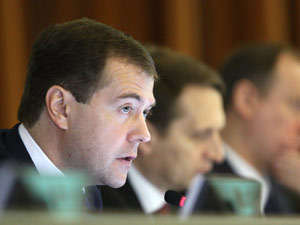 Russian and US presidents should make progress on long-range nuclear weapons cuts when they meet next month, but Moscow will be linking this to US anti-missile plans which it opposes, an official said.
Russian and US presidents should make progress on long-range nuclear weapons cuts when they meet next month, but Moscow will be linking this to US anti-missile plans which it opposes, an official said.
A follow-up pact to the 1991 Strategic Arms Reduction Treaty (START-1), which expires in December, is on the agenda for discussion when US President Barack Obama and Russia’s Dmitry Medvedev meet for the first time in London on April 1.
“We hope that in London we will get concrete instructions on what parameters and to what tempo we should work,” Deputy Foreign Minister Sergei Ryabkov told a news conference, referring to arms negotiators.
But Ryabov, while expressing “moderate optimism” at the forthcoming meeting, made clear Moscow would also be tying new START talks to US plans to build an anti-missile defence shield – a major irritant in relations.
Russia protested in 2002 when Washington unilaterally quit 1972 Anti-Ballistic Missile (ABM) treaty, which restricted both sides in building such systems.
Washington is now planning to station in Eastern Europe elements of a system which is designed to protect the United States from potential attacks by Iran, but which Moscow sees as a threat to its own national security.
“Agreements on reducing strategic weapons were political derivatives of the ABM treaty and for decades there was a clear understanding in both capitals that strategic stability only appears if both components are limited,” Ryabov said.
“In talks we are starting with the new administration, the meaning of the missile defence potential is growing stronger whether we want this or not,” he added.
“We will convey this logic to our partners.”
The START-1 committed Moscow and Washington to reducing their nuclear potentials to 6,000 warheads and 1,600 carrier devices such as missiles, bombers and submarines. Both sides met their commitments by 2002.
“Positive” signals
But disagreements over the US anti-missile shield plan and deteriorating bilateral ties have stalled work on a new treaty.
Ryabkov described as “positive” the signals Russia was receiving from Obama’s administration.
“We have seen a difficult period in relations,” he said.
“We are sure the lower point of this period is over. The much talked about ‘resetting of relations’ has started,” he said, referring to the Obama administration which has said it is time to press the “reset” button in ties.
“We look with moderate optimism at the period to come and expect good results from the meeting,” he added.
Russia views the restart of the arms reduction process by Moscow and Washington as an important element of handling the growing group of states with nuclear weapons, which also includes India, Pakistan and North Korea.
It insists that any new document must be legally binding and verifiable. Moscow also wants decommissioned nuclear warheads are destroyed rather than stockpiled.
Russia proposed to the previous administration of George Bush that it replace the US missile shield plan with an international project involving the United States, Russia and European states.
But Washington rejected the proposal and confirmed its commitment to deploy interceptor missiles in Poland and a radar in the Czech Republic.
However, Russian officials say they see evidence that Obama has shown less zeal in developing the system.
Ryabkov said the new mood in US-Russian ties raises hopes that sensitive issues like strategic arms reductions and anti-missile systems could be worked out before START-1 expires.
“The time remaining until December allows (us) to work out a serious and detailed document,” he said. “Signals from Washington show that commitment to move in that direction also exists there and this is very positive.”
 Eurasia Press & News
Eurasia Press & News
